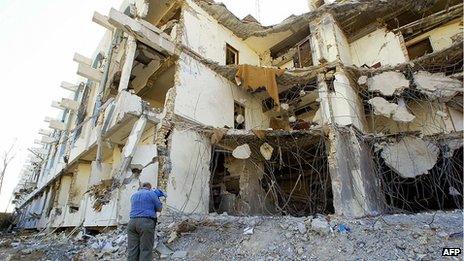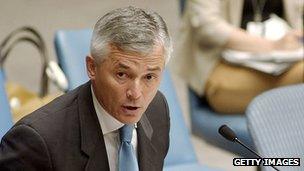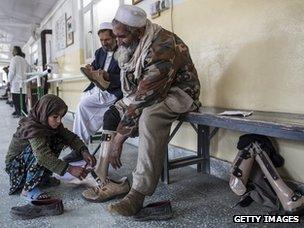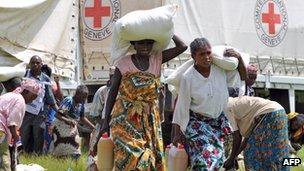How Baghdad attack put UN aid missions at risk
- Published

The devastating Baghdad attack in August 2003 stunned the UN
Ten years ago the headquarters of the United Nations in Baghdad was bombed - a shock attack widely seen as a turning point for the organisation.
It also marked a huge change in the way humanitarian agencies work around the world.
That afternoon hundreds of aid workers were in the UN offices, housed in the Canal Hotel. Among them was David Nabarro, who worked at the time for the World Health Organization.
"My colleagues and I were involved in an exercise to shape the future of health services in Iraq," he remembers. "Of course it was early stages, but we were very excited.
"We had a meeting with [UN mission chief] Sergio Vieira de Mello, and we were waiting downstairs to meet him, and suddenly our lives were turned upside down, because there was the most extraordinary noise, shaking, and the ceiling above us caved in, all the lights went off, and then there was silence."
'Things will never be the same'
Twenty-two people died in the bombing, most of them aid workers who had gone to help in the reconstruction of Iraq following the overthrow of Saddam Hussein.

Vieira de Mello worked for the UN for more than 34 years
Among the dead was Mr Vieira de Mello, a man both highly regarded for his dedication to humanitarian work and loved by his UN colleagues.
On taking the position, he had openly addressed the possibility of Iraqi resentment at the UN's presence, in the wake of the US-led invasion, saying that if his native Brazil had been invaded, he too would be angry.
After the bombing suspicions fell on Islamist insurgents led by Abu Musab al-Zarqawi, a militant later killed by a US air strike.
Mr Nabarro says he knew immediately that the effect on the UN's work would be enormous. "The very first thing that happened when picking myself up off the floor, and realising that I and the other people in the room were still alive, was the immediate sense that things will never be the same again," he said.
Just one day after the bombing the then UN secretary general Kofi Annan vowed to continue the mission in Iraq, praising the work done by Mr Vieira de Mello and his staff and adding: "The least we owe them is to ensure that their deaths have not been in vain."
In fact after another bombing just a few weeks later, the UN pulled out of Iraq completely and did not return for some years. For many aid workers, like UN human rights officer Craig Mokhiber, it seemed as if an ideal had died in the Canal Hotel along with some of his colleagues.
"I spent two years working in the Gaza Strip and I walked around freely, I enjoyed myself, my protection was from the host society that accepted and embraced the United Nations," he explains.
"And, we thought [we were] protected by the blue flag, protected by the reputation of the UN, that was essentially a neutral entity providing humanitarian assistance, development co-operation.
"I think in Baghdad on that day we began to change our thinking."
Aid as a target
Trying to understand why the UN was deliberately targeted in Baghdad seems at first easy.
Iraq had been the subject of UN Security Council-approved sanctions for many years, sanctions which had caused shortages and consequent resentment among the population. And although the UN did condemn the US-led invasion as illegal, the arrival of hundreds of UN aid workers just weeks after the US troops did look, to some at least, as if they were working together.
And many Iraqis will have been aware of events in Afghanistan, when US troops regularly distributed aid, while at the same time arresting people they suspected of being members of the Taliban.
Independent aid agencies such as Medecins Sans Frontieres (MSF), who were also working in Afghanistan, protested at this "blurring of the lines" between the military and humanitarian workers. They were particularly dismayed at US Secretary of State Colin Powell's remarks to the press describing humanitarian agencies as "an important part of our combat team".
In Iraq, and in more recent attacks elsewhere, not even the most impartial and neutral of all the aid agencies have been immune.
Just two months after the Canal Hotel bombing, the International Committee of the Red Cross (ICRC), which traditionally commands the utmost respect worldwide, had its offices in Baghdad bombed too.
ICRC director of operations Pierre Kraehenbuhl says he too remembers that moment as a pivotal one.

ICRC help for amputees in Kabul: Attacks on aid workers have put such projects at risk
"I got a phone call directly from our team in Baghdad that a car bomb attack had just taken place in front of our headquarters. It was clear that we were dealing with a paradigm shift in terms of security."
In subsequent years, ICRC workers have been attacked and killed in Pakistan and Afghanistan, and another worrying trend has emerged - attacks on health workers.
"We probably thought if anything was to remain protected it would be the medical profession," says Mr Kraehenbuhl. "Hospitals would be respected, and what's happening is very often the opposite - we've seen incidents in Yemen, and very serious incidents in Syria, and it's not about being caught up in the crossfire, it's the deliberate targeting of healthcare."
Extra security
The deliberate targeting of aid workers has led to a huge increase in security for humanitarian organisations. Many agencies, although rarely the ICRC, employ armed guards for protection.
Travelling alone is a thing of the past. Insurance companies tend to demand convoys of at least three vehicles, preferably armoured, before approving insurance for aid workers in regions deemed hostile.
All of this costs money which once may have been spent directly on humanitarian work. It also serves to blur the lines still further between the military and humanitarian workers, says long-time UN Refugee Officer Ekber Menemencioglu.
"There used to be a clear division between the military, the security and the humanitarian," he says.
"That doesn't exist any more, it's become very blurred, now they all have armoured vehicles, they all have walkie-talkies and bullet-proof vests and helmets, and it's perceived as the militarisation of humanitarian assistance and that's a big problem. The thing is now, how could you reverse it?"

The ICRC is helping to feed people in war-torn North Kivu, DR Congo
For Mr Menemencioglu, who has worked in some of the world's most difficult regions including Afghanistan and Sudan, a crucial element of humanitarian work is now missing.
"We have to work with our recipients of aid, with the people," he says. "We have to be able to go among them, talk to them, see their situation. You can't see those details unless you can walk and talk and listen and observe, and we can't do that any more."
Emphasis on local
Some aid workers, like Mr Nabarro, do not believe a return to the old days is possible. He believes the end of the Cold War, and the spread of fragmented conflicts, in which many non-state groups are fighting, has led inevitably to greater risks for international humanitarian organisations. But he believes some of the changes taking place because of those risks are positive.
"It was an absolute privilege to be able to go into a war situation, to be allowed passage, to meet with people, hear them, and try to provide assistance," he says.
But he, adds, the increased support for local aid workers in conflict situations is a good development.
The UN is striving to strengthen the capacity of national staff, he says: "so that they are better enabled to work in the service of their own people - that's the trend that I've seen over the last ten years and I think it's a good one.
"But we must recognise that in current hostilities no-one is neutral. I might feel personal regret that the golden opportunity that I once had is now not so available; I do believe that some of the new approaches are better in the long run."
- Published14 August 2013
- Published8 November 2012